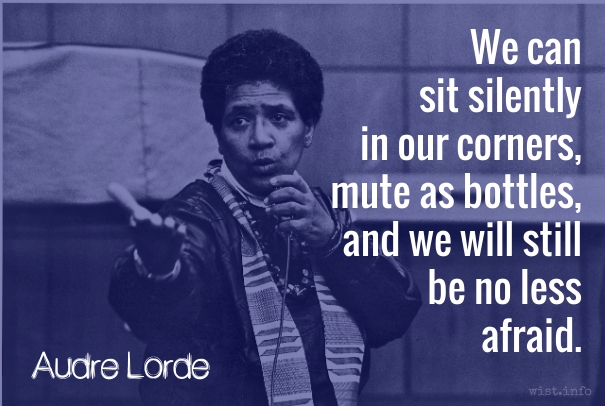The neurotic feels as though trapped in a gas-filled room where at any moment someone, probably himself, will strike a match.
Mignon McLaughlin (1913-1983) American journalist and author
The Second Neurotic’s Notebook, ch. 4 (1966)
(Source)
Quotations about:
apprehension
Note not all quotations have been tagged, so Search may find additional quotes on this topic.
A little embarrassment prevents a lot of goodness.
Mignon McLaughlin (1913-1983) American journalist and author
The Neurotic’s Notebook, ch. 8 (1963)
(Source)
“If rightly I read the trouble in thy breast,”
The shade of the Magnanimous replied,
“With cowardice thy spirit is oppressed,
Which oftentimes a man hath mortified,
So that it turns him back from noble deed,
As with false seeing a beast will start aside.”[“S’i’ ho ben la parola tua intesa”,
rispuose del magnanimo quell’ombra,
“l’anima tua è da viltade offesa;
la qual molte fïate l’omo ingombra
sì che d’onrata impresa lo rivolve,
come falso veder bestia quand’ombra.”]Dante Alighieri (1265-1321) Italian poet
The Divine Comedy [Divina Commedia], Book 1 “Inferno,” Canto 2, l. 43ff (2.43-48) [Virgil] (1309) [tr. Binyon (1943)]
(Source)
(Source (Italian)). Alternate translations:
If I your words have rightly understood,
Replied the Shade magnanimous, your Mind
Is stagger'd with distrust, which oft perverts
A good design with honour first begun:
As frequently the shadow of a beast
Appears more horrid than the form itself.
[tr. Rogers (1782), ll. 39-44]
"Speak'st thou thy thought!" the dauntless shade replies;
"Dishonour'd ever be that soul unwise,
That takes to counsel cold suggesting fear!
Unmanly fear, that chains the lib'ral mind,
And fills with dreadful chapes the puffing wind; --
But thou resolve, and scorn to linger here!
[tr. Boyd (1802), st. 9]
"If right thy words
I scan," replied that shade magnanimous,
"Thy soul is by vile fear assail'd, which oft
So overcasts a man, that he recoils
From noblest resolution, like a beast
At some false semblance in the twilight gloom."
[tr. Cary (1814)]
"If of thy words I rightly read the scope,
Thy stumbling soul," replied that hero-ghost,
"With its own cowardice is loth to cope.
Man oftentime she, cumbering to his cost,
Turns recreant from each generous aim away.
Like startled beast by mocking shadow crost."
[tr. Dayman (1843)]
"If I have rightly understood thy words," replied that shade of the Magnanimous, "thy soul is smit with coward fear,
which oftentimes encumbers men, so that it turns them back from honoured enterprise; as false seeing does a startled beast."
[tr. Carlyle (1849)]
"If well I understand your speech," replied
The shade of the Magnanimous, "your soul,
Hurt with vile cowardice, is in the toil
The which our nature often will embroil --
From honoured enterprise the mind recall,
Like a false bugbear, when the shadows fall."
[tr. Bannerman (1850)]
"If I thy words have rightly understood,"
Then answer'd me that shade magnanimous, --
"Thy spirit is by cowardice unstrung,
By which man oft is hinder'd and beset,
So that he turns away from honour's call,
As a beast starts, by vision false deceiv'd.
[tr. Johnston (1867)]
"If I have well thy language understood,"
Replied that shade of the Magnanimous,
"Thy soul attainted is with cowardice,
Which many times a man encumbers so,
It turns him back from honored enterprise,
As false sight doth a beast, when he is shy.
[tr. Longfellow (1867)]
‘If I have well understood thy word,’ replied that shade of the high-souled one, ‘thy soul is hindered by cowardice, which oftentimes so encumbers the man that it turns him back from honourable enterprise, as wrong-seeing does a beast when it shies.’
[tr. Butler (1885)]
"If thy words' meaning clearly I devise,"
Answered the shadow of that noble bard,
"Thy spirit of its vileness feels the poise,
Which many a time and oft will man retard,
So that the honoured enterprise they leave,
As beasts in darkness falsely things regard.
[tr. Minchin (1885)]
“If I have rightly understood thy speech,” replied that shade of the magnanimous one, “thy soul is hurt by cowardice, which oftentimes encumbereth a man so that it turns him back from honorable enterprise, as false seeing does a beast when it is startled."
[tr. Norton (1892)]
"If I have rightly understood thy speech," answered the shade of him of mighty mind, "thy spirit is assailed by cowardice, which oftentimes perplexeth man, so that it turneth him away from honoured enterprise, even as uncertain sight turneth a beast when it is growing dark."
[tr. Sullivan (1893)]
"If of thy words I have right understanding,"
That shade of the magnanimous made answer,
"Thy soul by cowardice is overpowered,
Which oftentimes doth so a man encumber
That back from honest enterprise it turns him,
As false sight doth a beast, when shades are falling.
" [tr. Griffith (1908)]
"If I have rightly understood thy words," replied the shade of that great soul, "thy spirt is smitten with cowardice, which many a time encumbers a man so that it turns him back from honourable enterprise, as a mistaken sight a shying beast."
[tr. Sinclair (1939)]
"If I have grasped what thou dost seem to say,"
The shade of greatness answered, "these doubts breed
From sheer black cowardice, which day by day
Lays ambushes for men, checking the speed
Of honourable purpose in mid-flight,
As shapes half-seen startle a shying steed."
[tr. Sayers (1949)]
"I understand your words, and the look in your eyes,"
that shadow of magnificence answered me,
"your soul is shrunk in that cowardice
that bears down many men, turning their course
and resolution by imagined perils,
as his own shadow turns the frightened horse."
[tr. Ciardi (1954)]
"If I have well understood what you say," the shade of that magnanimous one replied, "your spirit is beset by cowardice, which oftentimes encumbers a man, turning him from honorable endeavor, as false seeing turns a beast that shies."
[tr. Singleton (1970)]
"If I have truly understood your words,"
that shade of magnanimity replied,
"your soul is burdened with that cowardice
which often weighs so heavily on man
it turns him from a noble enterprise
like a frightened beast that shies at its own shadow."
[tr. Musa (1971)]
"If I have understood what you have said,"
replied the shade of that great-hearted one,
"your soul has been assailed by cowardice,
which often weighs so heavily on a man --
distracting him from honorable trials --
as phantoms frighten beasts when shadows fall."
[tr. Mandelbaum (1980)]
"If I have understood what you have said,"
The reply came from that shadow of generosity,
"Your spirit is touched by cowardice, which sometimes
Lies like a load on men, and makes them flag
So that they turn back from the fittest task,
Like an animal which mistakes what it looks at."
[tr. Sisson (1981)]
"If I understand," the generous shade retorted,
"Cowardice grips your spirit -- which can twist
A man away from the noblest enterprise
As a trick of vision startles a shying beast."
[tr. Pinsky (1994), ll. 36-39]
"If I have well understood your word," replied the shade of that great-souled one, "your soul is wounded by cowardice,
which many times so encumbers a man that he turns back from honorable endeavor, as a false sight turns a beast when it shies."
[tr. Durling (1996)]
The ghost of the generous poet replied: "If I have understood your words correctly, your spirit is attacked by cowardly fear, that often weighs men down, so that it deflects them from honourable action, like a creature seeing phantoms in the dusk."
[tr. Kline (2002)]
"If I have rightly grasped your idiom,"
replied my guide with kindly acumen,
"your coward soul has gone completely numb
with fear, which often does encumber men,
who, like a beast that's frightened by its shadow, shy away from
what they first maintained.
[tr. Carson (2002)]
"Supposing I have heard your words aright,"
the shadow of that noble mind replied,
"your heart is struck with ignominious dread.
This, very often, is the stumbling block
that turns a noble enterprise off-course --
as beast will balk at shadows falsely seen.
[tr. Kirkpatrick (2006)]
"If I have rightly understood your words,"
replied the shade of that great soul,
"your spirit is assailed by cowardice,
which many a time so weighs upon a man
it turns him back from noble enterprise,
the way a beast shies from a shadow."
[tr. Hollander/Hollander (2007)]
"If I have understood what you've just told me,"
The ghost of that gracious, mighty poet replied,
"Cowardice is overwhelming your soul,
A common weakness, swinging from side to side
A man's clear vision of honor's noble way,
As shapes and shadows deceive an animal's eyes."
[tr. Raffel (2010)]
"If I have understood your words aright,"
Magnanimously the great shade replied,
"Your soul is crumbing from the needless blight
Of misplaced modesty, which is false pride
Reversed, and many men by this are swayed
From honourable enterprise. One thinks
Of a dreaming beast that wakes with temper frayed
And finds the prowler into whom it sinks
Its teeth does not exist."
[tr. James (2013), l. 56ff]
Each day, futurity our bosom fills
With constant terror, for to think of woes
That are to come, is worse than to endure them.Euripides (485?-406? BC) Greek tragic dramatist
Andromeda [Ἀνδρομέδα], Fragment (412 BC) [tr. Wodhall (1809)]
(Source)
Barnes frag. 40, Musgrave frag. 18.
The pretext for indecisiveness is commonly mature deliberation; but in reality indecisive men occupy themselves less in deliberation than others; for to him who fears to decide, deliberation (which has a foretaste of that fear) soon becomes intolerably irksome, and the mind escapes from the anxiety of it into alien themes.
Henry Taylor (1800-1886) English dramatist, poet, bureaucrat, man of letters
The Statesman: An Ironical Treatise on the Art of Succeeding, ch. 21 (1836)
(Source)
Better hazard once than be always in fear.
Thomas Fuller (1654-1734) English physician, preacher, aphorist, writer
Gnomologia: Adages and Proverbs, # 906 (1732)
(Source)
Start now. Start where you are. Start with fear. Start with pain. Start with doubt. Start with hands shaking. Start with voice trembling but start. Start and don’t stop. Start where you are, with what you have. Just … start.
We can sit in our corners, mute forever, while our sisters and ourselves are wasted, while our children are distorted and destroyed, while our earth is poisoned. We can sit silently in our corners, mute as bottles, and we will still be no less afraid.
Audre Lorde (1934-1992) American writer, feminist, civil rights activist
“The Transformation of Silence into Language and Action,” The Cancer Journals (1980)
(Source)
Originally given as a speech at the Modern Language Association meeting (28 Dec 1977).
The only limit to our realization of tomorrow will be our doubts of today.
Franklin Delano Roosevelt (1882-1945) American lawyer, politician, statesman, US President (1933-1945)
Speech (Undelivered) for Jefferson Day (13 Apr 1945)
(Source)
Therefore, two bad habits must be forbidden, both the fear of the future and the memory of by-gone trouble; the latter no longer belongs to me, the former, not yet.



















